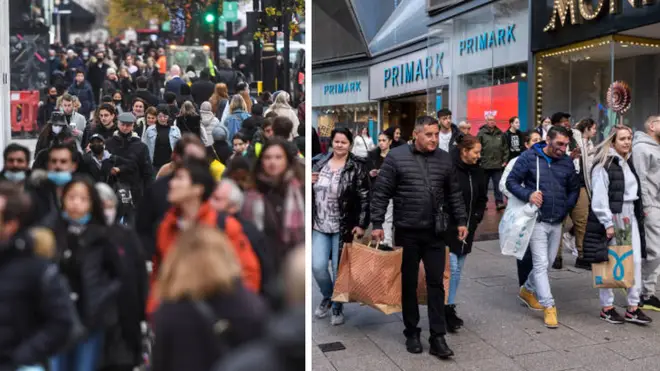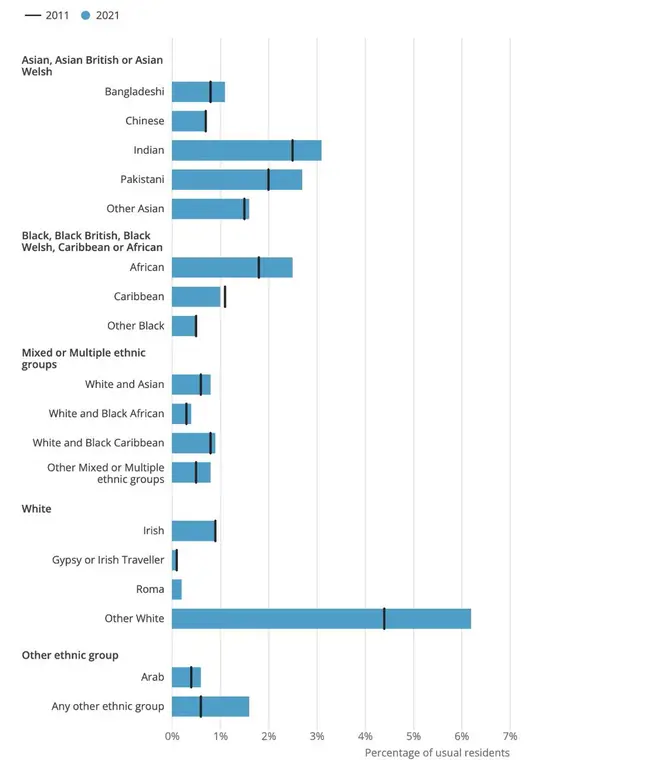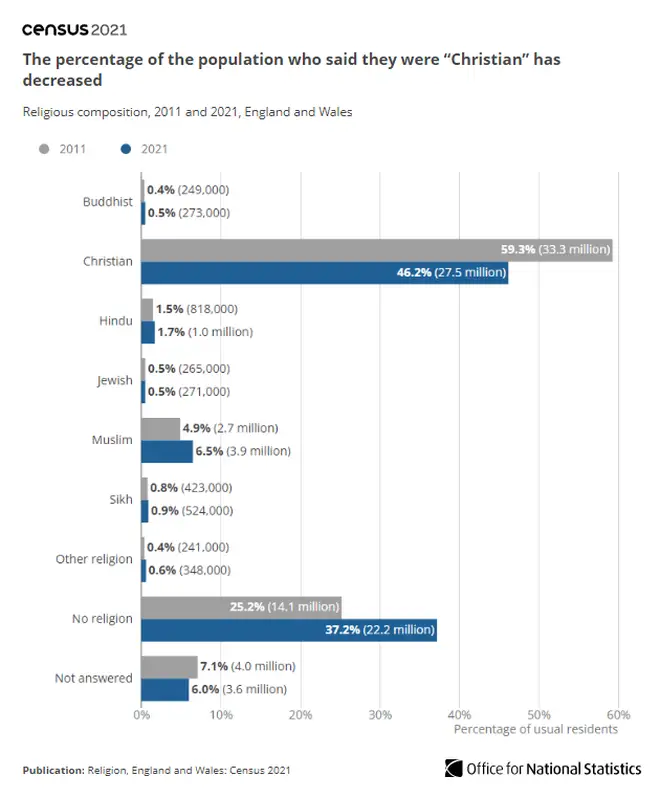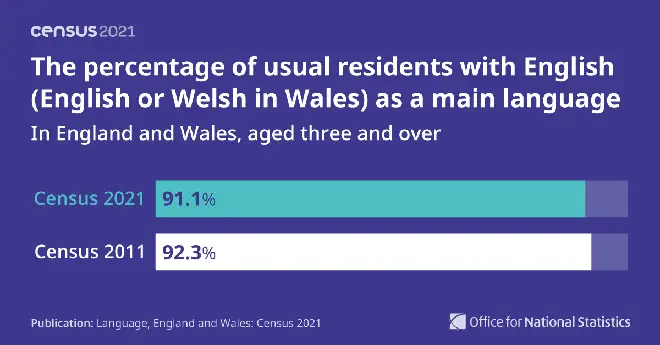
Clive Bull 1am - 4am
29 November 2022, 23:14 | Updated: 29 November 2022, 23:24

White British people are the minority in London and Birmingham, the UK's two largest cities, for the first time since records began, according to new census figures.
The white British population of London made up 37% of the capital in 2021, or 4.5 million, according to the Office for National Statistics (ONS. That was down from from 45 per cent, or 4.9 million people in 2011.
Meanwhile the white British population of Birmingham made up 581,000, or 52 per cent of the city in 2011. That had dropped to 43 per cent, or 491,000 people in 2021.
ONS researches say the figures show the "increasingly multicultural society we live in".
Several other smaller cities like Leicester and Luton are among parts of the country where people identifying as white now form a minority of the population, the data shows.
Some 14 local authorities recorded more than half of their usual residents as identifying with an ethnic group other than white, with the highest proportion in the London boroughs of Newham (69.2%), Brent (65.4%) and Redbridge (65.2%).
Outside London the highest non-white proportion is in Slough in Berkshire (64.0%), followed by Leicester (59.1%), Luton (54.8%) and Birmingham (51.4%).
The number of people identifying their ethnic group as white in England and Wales overall has also fallen by around half a million over the last decade.
Some 81.7 per cent of residents in the two nations self-identified as white on the day of the 2021 census, down from 86.0 per cent a decade earlier, the ONS said.
The second most common ethnic group in England and Wales was "Asian, Asian British or Asian Welsh" standing at 9.3 per cent, an increase from 7.5% in 2011.
Meanwhile the number of people who describe themselves as Christian in England and Wales also fell below 50 per cent for the first time, the ONS said.
Every other religion in the country has seen an increase or stayed the same, as the data also shows number of people identifying as Muslim has increased by 1.2 million to 3.9 million between 2011 and 2021.
Christians are still the largest religious group in England and Wales at 46.2 per cent of the population, with those with 'no religion' in second with 37.2 per cent - a rise of 12 per cent during the same period.
The data shows that England and Wales have "left behind the era when many people almost automatically identified as Christian," according to the Archbishop of York.
London was the most religiously diverse region of England as 25.3 per cent reported a religion other than “Christian”. This figure was 4.2 per cent in the North East and 3.2 per cent in the South West, making those regions the least religiously diverse.

How does religious diversity in your local area compare with the rest of England and Wales? 📍 Use our interactive map to find out 🔎
— Office for National Statistics (ONS) (@ONS) November 29, 2022
➡️ https://t.co/Nv6VDkSO9i pic.twitter.com/cQsh3rzRmW

Read More: England hope to finish strong in Group B's Battle of Britain as Wales need miracle - full guide
Read More: 'Call us to report corrupt cops', say Met Police bosses, after string of officer scandals
The number of people using English as a main language in 2021 in England and Wales has also fallen from 92.3 per cent in 2011 of usual residents aged over three compared to 91.1 per cent.
The most common main languages other than English (English or Welsh in Wales) in 2021 were:
The Romanian language saw the biggest increase in usage in 2021, with over 0.8 per cent (472,000) using it as their main language. This is up from 0.1 per cent (68,000) in 2011.

The Most Reverend Stephen Cottrell said: "It's not a great surprise that the Census shows fewer people in this country identifying as Christian than in the past, but it still throws down a challenge to us not only to trust that God will build his kingdom on Earth but also to play our part in making Christ known."
Census deputy director Jon Wroth-Smith said: "Today's data highlights the increasingly multi-cultural society we live in.
"The percentage of people identifying their ethnic group as 'White: English, Welsh, Scottish, Northern Irish or British', continues to decrease.
"Whilst this remains the most common response to the ethnic group question, the number of people identifying with another ethnic group continues to increase.
"However, the picture varies depending on where you live. London remains the most ethnically diverse region of England, where just under two-thirds identify with an ethnic minority group, whereas under 1 in 10 identify this way in the North East.
"But despite the ethnically diverse nature of society, 9 in 10 people across England and Wales still identify with a UK national identity, with nearly 8 in 10 doing so in London."